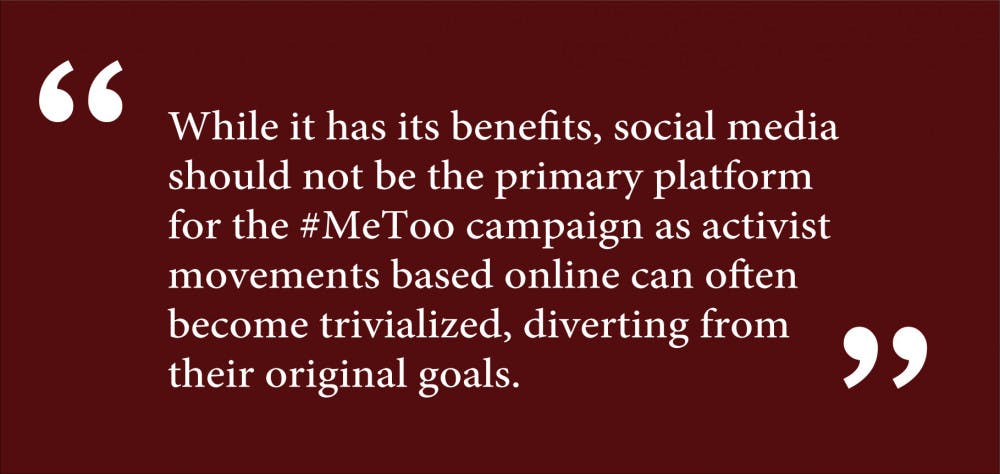Things I use Twitter for: political rants, news updates, funny videos, wholesome memes.
Things I do not use Twitter for: combatting sexual assault.
In recent years, social media has become a haven for introverts, celebrities and internet trolls to voice their thoughts in the hope that at least one of their followers will care about what they have to say. Twitter’s far-reaching, public nature has made it one of the main platforms for self-expression and raising awareness of issues, the most recent being the #MeToo campaign against sexual assault. While it has its benefits, social media should not be the primary platform for the #MeToo campaign as activist movements based online can often become trivialized, diverting from their original goals.
Last Sunday, Oct. 15, in the midst of the Harvey Weinstein scandals, actress Alyssa Milano took to Twitter and proposed that victims of sexual assault use the hashtag #MeToo to showcase the appalling magnitude of sexual assault. What ensued was a surge of posts from celebrities, politicians and ordinary people (of all genders) detailing their experiences of abuse on various social media outlets. By the following Tuesday, #MeToo was tweeted over 825,000 times, and posted over 12 million times on Facebook. The company estimated that 45 percent of its users in the United States were friends with someone who had posted a status with the words “me too.”
My initial response when I saw the hashtagged tweets was, “Okay, what now?” I had just skimmed through heartbreaking stories of sexual assault and abuse, and the first thing I wanted to do was think about something else. So I did. Literally with the flick of my thumb, I was reading a completely unrelated tweet about Joe Jonas’ recent engagement to Sophie Turner. I didn’t even think about the campaign again, until I saw an article explaining a “me too” movement had actually been started more than 10 years ago by activist Tarana Burke. A black woman’s decade-old movement to support sexually abused women of color had been rebranded and popularized by a famous white woman in less than 24 hours. Shocker.
As an avid Twitter user, I have seen so many serious and important problems shoot to the top of the “trending topics” page, only to be forgotten about a week later. Remember Kenneka Jenkins? Or the atrocities being committed by al-Shabab in Somalia? With so much exposure to people’s pain, it’s almost natural to become desensitized to human suffering on the internet. When a movement pops up between a surprise picture of puppies and an incoherent tweet from @realDonaldTrump, it’s hard to spread long-term awareness in a way that makes people see sexual assault for the affliction that it really is. Though #MeToo will generate conversation, as any viral hashtag does, reducing the prevalence of rape culture in our society will take more than a trending topic.
One may refute this argument by noting the success of campaigns like the #BlackLivesMatter movement, which started on Twitter and Tumblr. The main difference here is that #BlackLivesMatter founders Alicia Garza, Patrisse Cullors and Opal Tometi never intended their campaign to be just about social media presence. There was no rallying cry for all black people to publicize their trauma — the first #BlackLivesMatter tweets were in response to Trayvon Martin’s untimely death. If every black person in America had simply decided to tweet “me too,” the #BlackLivesMatter movement would not have nearly the impact that it did. Before, during and after the campaign, BLM activists have worked tirelessly offline to address the same issues of racism, mass incarceration and police brutality that they posted about on social media. #BlackLivesMatter has since evolved into an international activist organization with multiple local chapters and educational programming.
Social media was also effectively used by demonstrators during the Arab Spring. In 2011, Facebook was so instrumental in the protests against former Egyptian president Hosni Mubarak that one man even named his daughter after the platform. Similarly to the #BlackLivesMatter movement, online communities affected by the Arab Spring helped spread the word about the liberation efforts happening offline. Instead of solely focusing on the internet, these campaigns were used to facilitate hands-on activism, which is more likely to lead to long-term change.
Outlets like Twitter and Facebook can work well because of their ability to amplify voices — anyone, almost anywhere, can get their message across through social media. But the brevity of internet trends makes it almost impossible for us to foster permanent change. As nice as it would be, we can’t expect to eliminate rape culture from our society in 140 characters or less.
Bami Oke ’20 can be found tweeting about her spectacular life at @bamioke_ and can be reached by email (in the form of memes only) at bamidele_oke@brown.edu. Please send responses to this opinion to letters@browndailyherald.com and other op-eds to opinions@browndailyherald.com.




